ABM Archive Website
THIS WEBSITE CONTAINS ARCHIVE MATERIALS FOR HISTORICAL REFERENCE ONLY
For up-to-date information, including our latest appeals, news, and resources, please visit our current website.
Philippines: Church Growth project update
October 2017
In this video, The Most Reverend Renato Abibico, 5th Prime Bishop of the Episcopal Church in the Philippines, discusses the new approach taken by the church’s Integrated Mission Office (IMO). The IMO is supported by ABM through the ‘Church Growth in the Philippines’ project, funded by generous donations from our supporters.
Bishop Abibico explains the merging of two programs now under the IMO: Evangelism, Christian Stewardship and Nurture with Social Concerns. He states;
“We believe that there is no such thing as Evangelism and Christian nurture which does not talk about, and is not concerned with, social and environmental issues. In short, the church seeks to implement the first, second, third, fourth and fifth marks of mission.”
He goes on to explain the link between the work of the church and the 5 Marks of Mission. A summary of this explanation, along with details from the written report, is presented below.
Mark of Mission #1 – Proclamation of the Gospel
The Proclamation of the Gospel is interwoven in all the programs and activities of the Integrated Mission Office. Proclamation does not only mean reading the bible, doing the liturgy, and singing songs of praise, but it is more on doing what is just and lovely in the sight of the Lord. The IMO is committed to bringing the gospel of salvation to those who have not heard it yet in at least one community every year to every diocese.
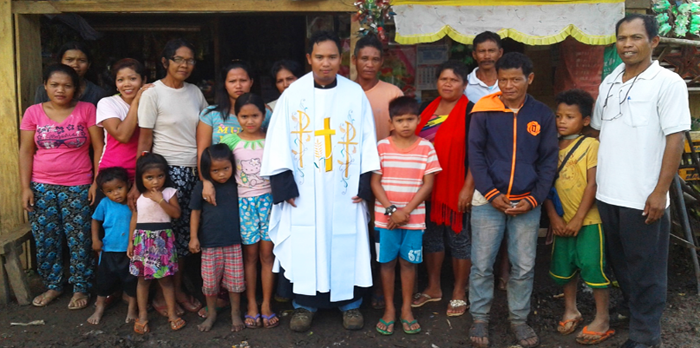 |
| A new mission in remote northern Mindanao, the Philiippines. © Episcopal Church of the Philippines 2017. Used with Permission. |
From October 2016 to present, the program opened 9 new mission stations. These communities are mostly in remote rural areas where there are no churches, and the gospel is proclaimed only through radio programs.
The opening of new mission areas in different dioceses listed a number of 627 families all in all.
Mark of Mission #2 – Nurture of Believers
The Episcopal Church in the Philippines recognizes that it is important for new believers and the general church membership to be fed with spiritual food and nourished with pastoral care.
Integrated Missions Office therefore works according to needs of the people. In the far south of the Philippines, the IMO’s spearheads the distribution of Bibles in Tagalog (the dialect specific to the country). Copies of the Holy Bible are often completely new to people here, and for some it’s their first time to have one of their own. This will be a continuing project, especially to new mission areas.
The Integrated Mission Office also wanted to strengthen the pastoral presence in Hospitals, Prison/Correctional Institutions and at Homes. We believe that a pastoral presence for families or individuals in need is very important in nurturing their faith. With help of selected chaplains and other volunteer contributors, the IMO will launch its re-orientation for clergy in the dioceses. The IMO is positive that this will help clergy in their evangelism and pastoral care. This activity will run from September until October 2017.
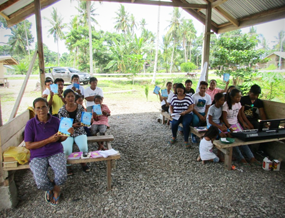 |
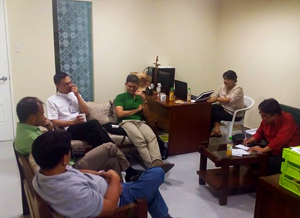 |
|
| The newly opened Mission expansion areas in Kisek, Ranao, Pailan happily received copies of the Holy Bible translated in their native dialect. © Episcopal Church of the Philippines 2017. Used with Permission. |
Discussions on pastoral care at the IMO provincial Office. A manual for pastoral care and presence was drafted and is now ready for use in the Dioceses. © Episcopal Church of the Philippines 2017. Used with Permission. |
Mark of Mission #3 – Loving Service to Human Needs
The Integrated Mission Office continues to work hard against destructive social practices such as gambling, prostitution, corruption and illegal drug use. The Episcopal Church Dioceses actively participate in the rehabilitation efforts of the government concerning drug users. The church provides close support to members who admitted to be drug users, and helps them through counselling and rehabilitation plans.
It also strengthened the campaign against human trafficking, particular in vulnerable rural areas. The IMO conducted community forums on human trafficking based on the lure of “work offered abroad” or “kasambahay sa maynila”. It is a problem that involves youth from 13-17 years old, as many dream of a better life free from poverty. The church is therefore actively working to guard against this exploitation by providing constant reminders and educational forums on what really happens in illegal recruitments for foreign and domestic jobs.
Mark of Mission #4 – The Transformation of Unjust Structures in Society, Challenging Violence of every kind and Pursuing Peace and Reconciliation
The Episcopal Church in the Philippines assisted evacuees from the war torn Marawi City. Food packs were first brought to the area from different donors for the evacuee’s survival.
Medical mission are also spearheaded by the Integrated Missions Office, aiming to provide quality medical care to communities in remote rural locations.
Taught by experience, the IMO formed the Diocesan Disaster Response Teams that were trained to handle responses to typhoons and floods. With these we expect more organized response efforts, which are coordinated in a timely and appropriate manner.
Mark of Mission #5 – The Safeguarding of the Integrity of Creation
The Diocesan Integrated Missions Offices tightened their campaign against large scale mining in the Philippines. They provide spiritual and moral support for people gathering to resist the entry and operation of large scale mining, especially in the northern part of Luzon. In another dam project, people are protesting the displacement of thousands of people and the submersion of valuable agricultural farmland.
The IMO spearheads work on the diocesan level of reforestation projects, implemented by parishes or lay organizations. In the last 8 months, they have planted more than 62,000 assorted trees in all the dioceses, the equivalent of 42 hectares of reforested land.
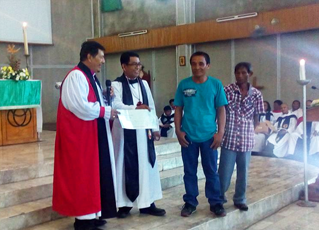 |
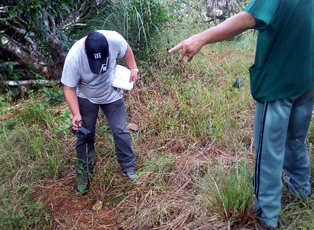 |
|
| Prime Bishop Renato Abibico awards tree-planting certificates.© Episcopal Church of the Philippines 2017. Used with Permission. |
An IMO Provincial Officer conducts validation checks on tree plantings. © Episcopal Church of the Philippines 2017. Used with Permission. |
ABM would like to thank all our generous supporters who have donated towards this project. Your support is ensuring the continued growth and development of the vibrant Episcopal Church in the Philippines, reaching many people with the Good News of the gospel.


